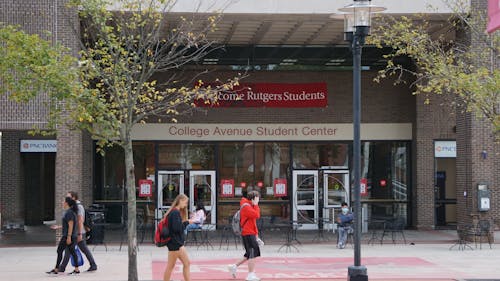SOHAIL: Rutgers is robbing you
Column: Nohman's Nuances

You are a second-year student living on campus. Last semester, you used a meal swipe within your 210 minimum plan that took approximately $13 out of your pocket for unlimited food at Brower Commons on the College Avenue campus. After a lecture, you then board an LX to Livingston campus to use a meal swipe for $12 worth of food at Henry's Diner.
You are not getting your money's worth, but at least it is bearable.
Fast forward to next semester, your tuition has increased by $387, and your housing has increased by an additional 5 percent. The minimum meal plan you are assigned for residential hall life — 150 swipes — gives you a value of $18.51 per swipe.
Brower Commons is gone, and the College Avenue campus no longer has an all-you-can-eat option with healthy food. You drive to Henry's and find that its entire menu is limited to one food option and one drink. Frustrated at your situation, you return to the car you left minutes ago and find a parking ticket.
Rutgers has created a mask that presents itself as a chance at academic enlightenment to conceal the fact that your money is being siphoned away right under your nose. From your tuition and housing costs that rise each academic year and your required meal swipe plan to the predatory parking passes that have strayed from maintaining the public good, it is clear that our school is robbing us.
To preface, Rutgers is often credited as being a financial powerhouse compared to other institutions. Being a State University, it receives ample funding from New Jersey, with 19 percent of the budget derived from state appropriations. Along with an endowment that nears $2 billion, our University has the funds for its illustrious research grants, public service and academic instruction.
In fact, a research study conducted by the Rutgers American Association of University Professors and American Federation of Teachers found that across a myriad of factors, the University’s financials never dip below "very good" or "A" on Moody’s Rating Scale, a tool used to assess credit health for institutions and individuals.
In addition, Rutgers holds approximately $580 million in 2020 in unrestricted reserves. Restricted reserves are reserves set with a specific purpose, while unrestricted reserves tend to accumulate from budget surpluses of previous years and can be generally used for any purpose.
Nonetheless, the most significant stream of revenue for Rutgers is through tuition and fees, which account for approximately 29 percent of the budget. At the start of the fiscal year, the Board of Governors approved a $5.4 billion budget that included a 6 percent increase in tuition and a 5 percent increase in housing fees, citing energy costs, health insurance, pension costs and rising faculty salaries as prominent contributing factors to the sharp increase.
This is a gross attempt to make the faculty strike a scapegoat and deter future unions. In unrestricted reserves alone, Rutgers has more than enough to cover teacher salaries, not to mention the fact that it received an additional $33 million in funding across the board from the state. Even Gov. Phil Murphy (D-N.J.) said that he was "not a fan" of the rise in tuition as a response.
More covertly, Rutgers policies regarding meal plans have drained its students of money under the guise of nutritional concern. Despite the fact that retail swipes are limited to $10, food prices are rising in retail locations like Cafe West on the College Avenue campus and Kilmer’s Market on Livingston campus.
The unlimited dining at Brower Commons has been replaced by a limited, cheaper, less healthy alternative.
Additionally, meal swipe minimums, like the on-campus mandatory 210 plan for first-year students and 150 plan for returning students in residence halls, limit student discretion on how much to spend on food by implementing a "price-floor" through their average swipe costs.
It is ridiculous that if you are hungry as a second to fourth-year student living in residence halls, you must pay the equivalent of $18.51 to eat. Both plans also leave significant room for "under-swiping," when Rutgers generates profit through unused meal swipes.
This fall, the University even had the gall to assign a removable 50-swipe meal plan to off-campus residents, disingenuously citing "food insecurity" and accessibility as reasons. While this fee can be waived, the average cost for a meal swipe under this plan is $20.30.
Finally, parking tickets have become so common that they are almost seen as a tax by many Rutgers students who drive. It seems that the policies become stricter, and the financial holds are levied sooner as each semester passes. Through parking violations, the University collects millions from students each year.
Letting Rutgers get away with this host of increased dues will only enable it to further increase our cost of attendance. While some undergraduate students, graduate students and faculty futilely protested these price increases at a hearing in April, there has yet to be any collective, requisite and necessary action taken by our University.
Nohman Sohail is a sophomore in the School of Arts and Sciences majoring in economics and political science. His column, "Nohman's Nuances," runs on alternate Tuesdays.
*Columns, cartoons and letters do not necessarily reflect the views of the Targum Publishing Company or its staff.
YOUR VOICE | The Daily Targum welcomes submissions from all readers. Due to space limitations in our print newspaper, letters to the editor must not exceed 900 words. Guest columns and commentaries must be between 700 and 900 words. All authors must include their name, phone number, class year and college affiliation or department to be considered for publication. Please submit via email to oped@dailytargum.com by 4 p.m. to be considered for the following day’s publication. Columns, cartoons and letters do not necessarily reflect the views of the Targum Publishing Company or its staff.



